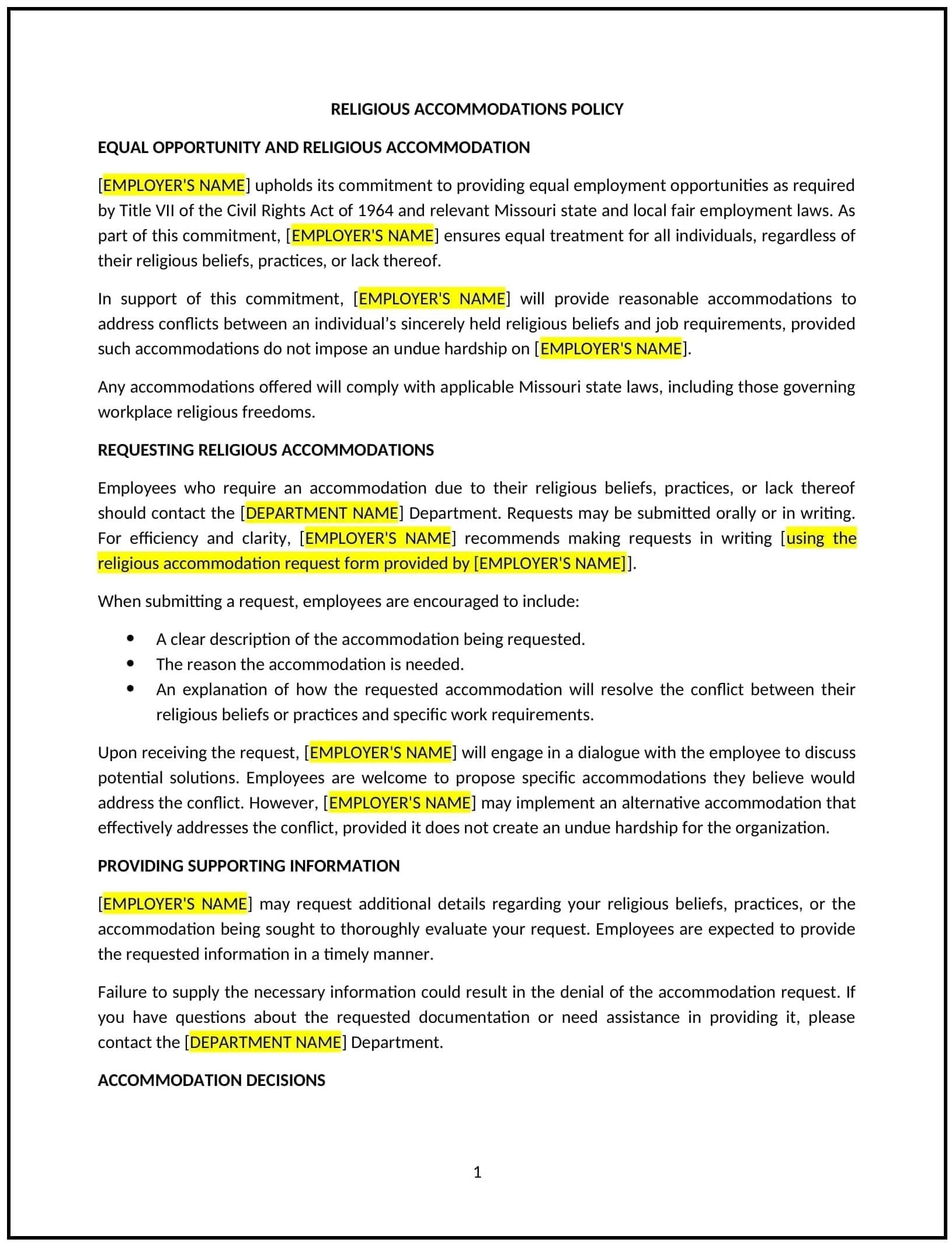Religious accommodations policy (Missouri): Free template
Got contracts to review? While you're here for policies, let Cobrief make contract review effortless—start your free review now.

Customize this template for free
Religious accommodations policy (Missouri)
A religious accommodations policy helps businesses in Missouri address the needs of employees who require time off or other adjustments to their work schedule due to religious practices and beliefs. This policy outlines the process for requesting religious accommodations, the types of adjustments that may be considered, and the company’s commitment to respecting employees' religious needs while balancing operational requirements. It is designed to promote an inclusive workplace and ensure that employees are treated fairly and respectfully in accordance with their religious practices.
By adopting this policy, businesses can demonstrate their commitment to diversity and inclusion, foster employee satisfaction, and minimize the risk of discrimination claims related to religious beliefs and practices.
How to use this religious accommodations policy (Missouri)
- Define religious accommodations: Clearly explain what constitutes a religious accommodation, such as time off for religious observances, adjustments to work schedules, dress code exemptions, or any other adjustments needed to practice religious beliefs.
- Set the request process: Outline the steps employees should follow to request religious accommodations, including providing notice to their supervisor or HR, submitting a formal request, and providing any supporting documentation if required.
- Address reasonable accommodations: Define what constitutes a reasonable accommodation, ensuring that adjustments made do not impose an undue hardship on the business operations. Include examples of potential accommodations, such as flexible work hours or schedule adjustments.
- Promote open communication: Encourage employees to communicate their religious accommodation needs openly and without fear of discrimination, and ensure managers are trained to handle these requests respectfully and confidentially.
- Balance business needs: Establish how the company will evaluate accommodation requests to balance employees' religious needs with operational demands. Ensure the policy outlines the criteria for determining whether accommodations can be made without causing undue hardship on the business.
- Include dispute resolution: Define the process for resolving disputes if the employee feels their request has been unfairly denied or if the company cannot provide a requested accommodation. Include steps for employees to appeal decisions.
- Review regularly: Periodically review and update the policy to ensure it is aligned with changes in Missouri state law, federal regulations, and evolving business practices related to religious accommodations.
Benefits of using this religious accommodations policy (Missouri)
This policy provides several benefits for businesses in Missouri:
- Promotes inclusivity: By respecting employees' religious beliefs and offering reasonable accommodations, businesses create an inclusive work environment that values diversity and fosters mutual respect.
- Reduces discrimination risks: A well-defined policy helps businesses avoid discrimination claims by ensuring that religious accommodation requests are handled fairly and consistently in accordance with legal and ethical standards.
- Enhances employee satisfaction: Offering accommodations for religious practices can improve employee morale and loyalty, as employees feel supported and respected by their employer.
- Supports legal compliance: The policy helps businesses comply with Missouri state laws and federal regulations, such as the Civil Rights Act, that require employers to provide reasonable accommodations for religious practices.
- Strengthens company culture: A company that demonstrates respect for diverse religious beliefs builds a positive reputation, attracts diverse talent, and contributes to a more supportive and collaborative workplace.
- Increases retention: By accommodating religious needs, businesses can retain valuable employees who may otherwise seek employment elsewhere if their religious practices were not supported.
Tips for using this religious accommodations policy (Missouri)
- Communicate the policy clearly: Ensure all employees are aware of the policy and understand how to request religious accommodations. This should be communicated during onboarding and regularly throughout the employee’s tenure.
- Encourage early requests: Encourage employees to make accommodation requests as early as possible, allowing sufficient time for evaluation and adjustments to be made without disrupting business operations.
- Foster a respectful environment: Train managers and supervisors to handle religious accommodation requests with sensitivity and respect, ensuring that employees feel comfortable and valued when making requests.
- Ensure confidentiality: Protect employees’ privacy when handling religious accommodation requests and ensure that details of the employee's religious beliefs or practices are not shared without their consent.
- Provide a clear process for disputes: Establish a process for resolving disputes related to religious accommodations, including a formal appeal procedure if an accommodation request is denied.
- Review regularly: Periodically review and update the policy to ensure it reflects changes in legal requirements, business practices, and employee feedback related to religious accommodations.